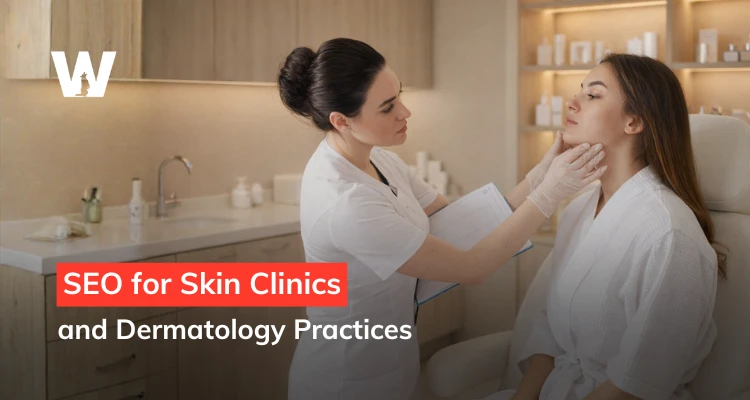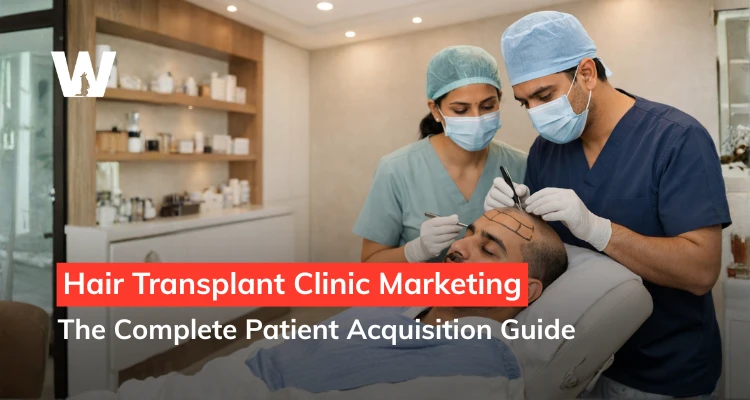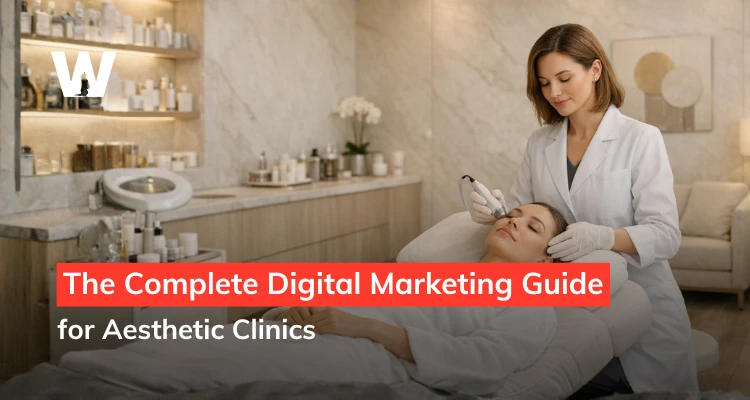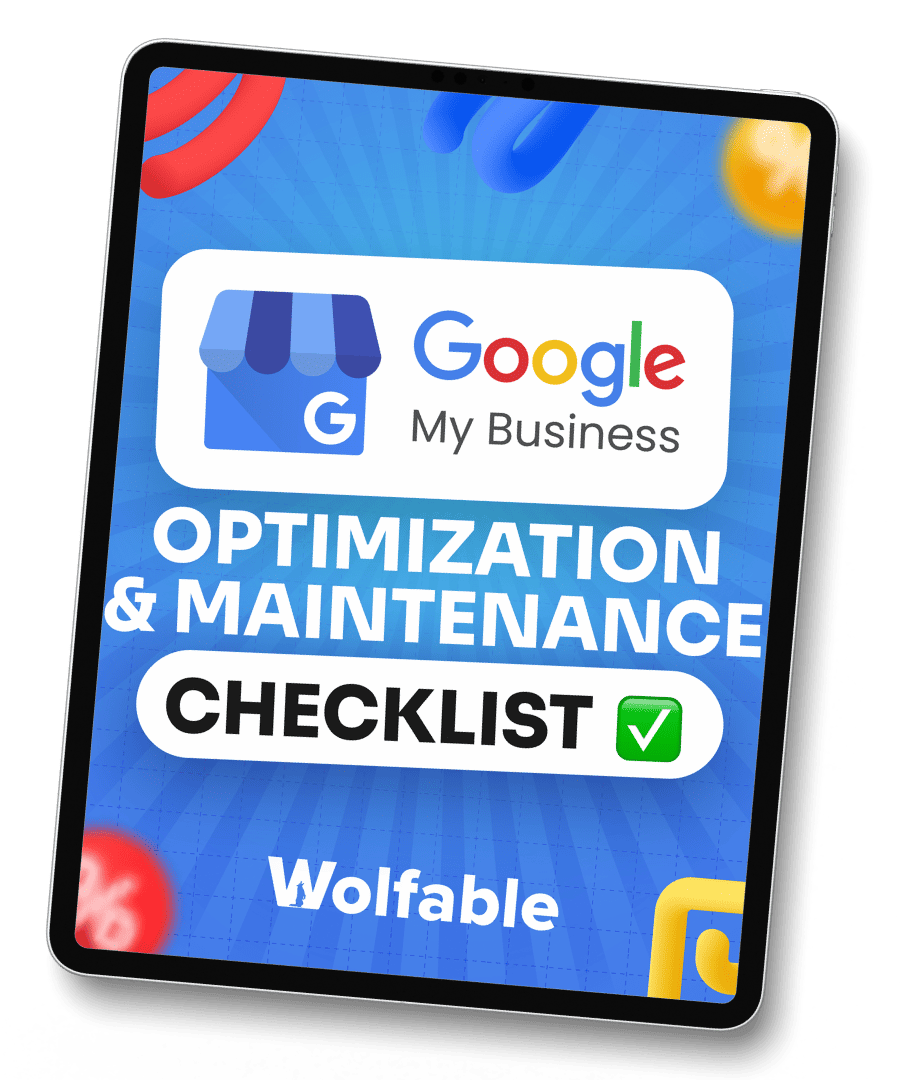Wraps up in 10 Minutes
Have you noticed how healthcare marketing has transformed in recent years? Digital Marketing with AI in Healthcare Marketing has evolved from a futuristic concept to an essential strategy driving patient acquisition and engagement.
Today's healthcare landscape demands more than traditional marketing approaches. With patients researching symptoms online before booking appointments and comparing providers with the same scrutiny as hotels on TripAdvisor, healthcare organizations need advanced digital strategies.
AI is no longer optional—it's necessary for healthcare marketers who want to stay competitive while maintaining HIPAA compliance. From predicting patient needs to personalizing communication at scale, artificial intelligence is transforming how healthcare organizations connect with their audiences.
At Wolfable, we've seen firsthand how AI integration helps healthcare clients achieve remarkable results while reducing marketing costs. Let's explore this revolution together.
What is AI in Healthcare Marketing?
The New Foundation
What exactly does AI in healthcare marketing mean? Simply put, it's the application of artificial intelligence technologies to enhance marketing strategies specifically for healthcare organizations.
AI in healthcare marketing uses machine learning algorithms, natural language processing, and data analytics to understand patient behavior, personalize messaging, and optimize marketing campaigns for better results.
Unlike general marketing AI, healthcare-specific solutions prioritize patient privacy, regulatory compliance, and medical accuracy while delivering personalized experiences.
Core AI Technologies Reshaping Healthcare Marketing
AI in healthcare marketing isn't a single tool but a collection of technologies working together:
- Machine Learning (ML): Analyzes patient data to identify patterns and predict future behaviors
- Natural Language Processing (NLP): Understands and generates human language for content creation and chatbots
- Computer Vision: Analyzes medical images and creates visual content
- Predictive Analytics: Forecasts patient needs and marketing performance
- Recommendation Systems: Suggests relevant content and services to patients
These technologies create a powerful ecosystem that enhances every aspect of healthcare marketing, from patient acquisition to retention.

Why Use AI? The Compelling Benefits
1. Personalization at Scale
How can you make each patient feel like your only priority? AI enables hyper-personalization without requiring additional staff.
By analyzing patient data and behavior patterns, AI creates individualized experiences across all touchpoints. AI-driven personalized email campaigns can target patients based on their medical history and engagement patterns, creating customized experiences that feel individual to each recipient without requiring massive staffing resources.
This level of personalization was previously impossible without massive teams of marketers—now it's automated.
2. Enhanced ROI and Efficiency
AI-powered marketing delivers exceptional returns on investment for healthcare organizations through automation and optimization capabilities.
Healthcare organizations implementing AI-driven marketing report significant improvements:
- 27% reduction in patient acquisition costs
- 32% increase in marketing-qualified leads
- 40% improvement in campaign performance
Healthcare organizations can significantly reduce expenses by automating content creation and campaign optimization using AI tools, freeing up budget for other strategic initiatives.
3. Regulatory Compliance with Confidence
How do you balance personalization with privacy in healthcare? AI systems designed specifically for healthcare maintain HIPAA compliance while delivering personalized experiences.
Modern healthcare AI platforms include built-in compliance safeguards that:
- Automatically detect and protect PHI (Protected Health Information)
- Maintain audit trails for regulatory requirements
- Ensure marketing content adheres to medical advertising guidelines
This protection allows healthcare marketers to leverage data without risking violations.
How to Apply AI Across Healthcare Marketing Services
1. Social Media Marketing + AI
Can AI improve your social media presence while maintaining medical accuracy? Absolutely—and it's transforming how healthcare organizations approach social platforms.
AI enhances healthcare social media marketing by:
- Generating compliant, engaging content tailored to specific audiences
- Identifying optimal posting times based on patient engagement patterns
- Monitoring mentions for service issues or reputation management
- Analyzing competitor strategies to identify opportunities
By analyzing patient conversations with AI, healthcare organizations can identify unmet information needs and create targeted content that resonates more deeply with audiences, driving substantially higher engagement rates.
2. Performance Marketing + AI
How can AI make your healthcare ads more effective? By making them smarter and more targeted.
AI transforms performance marketing for healthcare through:
- Predictive bidding that optimizes ad spend in real-time
- Patient journey mapping that delivers the right message at the right time
- Multivariate testing that continuously improves conversion rates
- Audience segmentation beyond basic demographics
With AI-powered performance marketing, healthcare organizations can achieve precisely targeted campaigns that reach the right patients at optimal moments in their healthcare journey, significantly improving both efficiency and outcomes.
3. SEO & Content Marketing with AI
Can AI help patients find your healthcare services when they need them most? It's becoming essential for visibility in today's search landscape.
AI-powered SEO and content marketing include:
- Predictive keyword research based on patient search patterns
- Automated content briefs that address patient questions
- Medical content optimization for accuracy and readability
- Local SEO enhancement for practice locations
A healthcare system in the Southeast used AI-generated content optimization to increase organic traffic by 64% and first-page rankings for treatment-specific keywords by 47%.
4. Email & Automation with AI
How can you stay connected with patients without overwhelming your staff? AI-powered email and automation provide the answer.
Healthcare organizations leverage AI for:
- Behavior-triggered email sequences based on patient interactions
- Predictive segmentation that anticipates patient needs
- Smart appointment reminders that reduce no-shows
- Personalized health education tailored to patient conditions
With AI automation, healthcare providers can maintain consistent communication with patients throughout their entire healthcare journey while reducing administrative burden on staff and improving appointment adherence.
5. AI Solutions & Web Development
Can your website adapt to each visitor's needs? With AI integration, it can become a dynamic patient resource.
AI enhances healthcare websites through:
- Symptom checkers that guide patients to appropriate services
- Chatbots that answer common questions and schedule appointments
- Content personalization based on visitor behavior and needs
- Accessibility features that adapt to user requirements
AI chatbots can handle a significant portion of initial patient inquiries, dramatically reduce appointment scheduling time, and improve overall patient satisfaction by providing immediate responses at any hour.
Get a Free AI-Powered Marketing Audit from Wolfable – India’s Leading Healthcare Digital Agency
Best Practices & Tips for AI Integration in Healthcare Marketing
1. Actionable Takeaways for Seamless AI Integration
The path to AI marketing success in healthcare requires strategic implementation:
- Start with clearly defined objectives that align with organizational goals. Whether improving patient acquisition or enhancing engagement, specific metrics ensure meaningful implementation.
- Build a solid data foundation before implementing advanced AI. Clean, structured patient data (anonymized and compliant) provides the fuel AI needs to generate valuable insights.
- Adopt a hybrid approach combining AI with human expertise. AI excels at analysis and automation, while healthcare marketing professionals provide strategic oversight and compliance validation.
- Begin with pilot programs focused on high-impact areas. Implement AI in one marketing channel before expanding, allowing for controlled testing and refinement.
2. Dos & Don'ts to Maximize ROI and Stay Compliant
| Do | Don't |
|---|---|
| Implement AI with privacy by design principles | Rush AI implementation without compliance checks |
| Train AI systems on healthcare-specific data | Use general marketing AI without healthcare adaptations |
| Maintain human oversight for medical accuracy | Allow AI to generate unchecked medical claims |
| Start with narrow, specific AI applications | Try to transform everything at once with AI |
| Measure AI impact with concrete metrics | Implement AI just because competitors are doing it |
| Use AI to enhance patient education | Replace personalized care with automation |
| Validate AI outputs for cultural sensitivity | Ignore demographic differences in AI responses |
Overcoming Implementation Challenges in Healthcare AI Marketing
1. Breaking Through the Barriers
Ready to implement AI in your healthcare marketing but concerned about potential roadblocks? You're not alone. Let's tackle the four most common challenges with practical solutions you can implement today.
Challenge #1: Disconnected Data Systems
The Problem: Your patient data lives in separate systems—EMR, CRM, marketing platforms—making it impossible for AI to access the complete picture.
The Solution:
- Begin with a data integration audit to map all your information sources
- Prioritize connecting your marketing CRM with your patient engagement data
- Implement secure API connections between critical systems
- Start small with one unified dataset before expanding
Challenge #2: Team Resistance
The Problem: Your marketing team worries that AI will replace their jobs or disrupt workflows they've perfected over years.
The Solution:
- Reframe AI as an "intelligence amplifier" rather than a replacement
- Demonstrate how AI eliminates tedious tasks like report generation and data entry
- Create specific examples showing how team members can elevate their work
- Involve skeptical team members in choosing and implementing AI tools
Challenge #3: Compliance Uncertainty
The Problem: The intersection of healthcare regulations and AI capabilities creates anxiety about potential violations.
The Solution:
- Develop a clear AI governance policy specifically for marketing activities
- Include privacy officers early in your implementation planning
- Choose healthcare-specific AI platforms with built-in compliance safeguards
- Create a simple compliance checklist for everyday marketing decisions
Challenge #3: Limited Budget
The Problem: Full-scale AI implementation seems expensive, especially for smaller healthcare organizations.
The Solution:
- Start with high-ROI, low-cost applications like content optimization
- Implement basic chatbots that handle appointment scheduling inquiries
- Use free or low-cost AI writing assistants for content creation
- Measure and document every dollar saved to build the case for expansion
2. Measuring Success: KPIs That Actually Matter
Wondering how to prove your AI investments are paying off? Focus on these four high-impact measurement areas instead of vanity metrics.
1. Patient Acquisition Quality
Track not just new patient numbers but the quality of those relationships:
- Patient lifetime value comparison between AI-sourced vs. traditional channels
- Referral rates from patients acquired through AI-optimized campaigns
- Retention rates across different acquisition methods
2. Content Engagement Depth
Measure how AI-powered personalization impacts patient education:
- Time spent with personalized vs. generic content
- Resource utilization rates after consuming AI-recommended content
- Knowledge retention scores for critical health information
3. Team Efficiency Gains
Quantify how AI transforms your marketing team's capabilities:
- Hours saved on routine tasks now handled by AI
- Increase in high-value strategic activities
- Volume of campaigns managed per team member
- Reduction in revision cycles for marketing materials
4. Patient Journey Improvements
Evaluate how AI enhances the conversion pathway:
- Reduction in abandonment at critical decision points
- Decrease in time from first engagement to appointment
- Improvements in patient preparation before visits
- Increase in follow-through on treatment plans
By focusing on these practical solutions and meaningful metrics, your healthcare organization can overcome implementation hurdles and unlock AI's full potential in your marketing efforts.
Traditional vs. AI-Enhanced Healthcare Marketing
The Game-Changing Difference
What happens when healthcare marketing evolves from manual processes to AI-powered strategies? The transformation is nothing short of revolutionary. Let's look at four critical areas where AI isn't just improving marketing—it's completely reimagining it.
Why This Matters for Patient Outcomes
This technological evolution creates more than marketing efficiency—it fundamentally changes how patients experience healthcare. When content precisely matches information needs, patients make better-informed decisions. When journeys adapt to individual preferences, engagement deepens, leading to better adherence and outcomes.
For healthcare marketers, AI transformation means shifting from "creating campaigns" to "orchestrating experiences" that respond intelligently to each patient's unique situation. The result isn't just incremental improvement—it's a fundamental leap forward in healthcare marketing capabilities that directly impacts patient care quality.
Future Outlook & Trends in AI Healthcare Marketing
A. Emerging AI Technologies
What's next for AI in healthcare marketing? These innovations will revolutionize patient connections:
1. Multimodal AI Integration
- Combines text, image, and voice understanding in unified systems
- Creates seamless experiences as patients move between devices and platforms
- Prioritizes voice-first interactions for greater accessibility
- Enables natural conversation with healthcare systems similar to speaking with providers
2. Federated Learning Adoption
- Allows AI systems to learn from data across multiple locations without centralizing it
- Maintains strict patient privacy while still improving algorithm performance
- Solves healthcare's data sharing challenges through secure distributed learning
- Enables smaller practices to benefit from AI without massive data resources
3. Ambient Intelligence Deployment
- Transforms physical healthcare locations with responsive digital environments
- Connects online marketing interactions with in-person office experiences
- Creates continuity between digital engagement and actual provider visits
- Uses environmental sensors to personalize waiting room experiences and educational content
B. Predictions for Patient Engagement
How will patient relationships evolve with AI? We anticipate these significant shifts:
1. Predictive Health Journey Mapping
- Anticipates patient needs before they consciously recognize them
- Shifts from reactive to proactive communication models
- Identifies early warning signs of potential health concerns through engagement patterns
- Delivers preventive information precisely when patients are most receptive
2. Hyper-Personalized Content Experiences
- Adapts in real-time based on observed patient interactions
- Creates educational resources matched to individual learning styles
- Adjusts content complexity based on demonstrated health literacy levels
- Personalizes examples, metaphors, and explanations to patient's unique context
3. Trust-Based AI Marketing Framework
- Emphasizes transparency about how AI is used in patient communication
- Provides clear explanations of how patient data improves their healthcare experience
- Gives patients meaningful control over their data and personalization preferences
- Builds confidence through consistent privacy protection and value demonstration
Conclusion
Digital Marketing with AI in Healthcare Marketing represents the future of patient connection. As we've explored, AI technologies offer unprecedented opportunities to enhance personalization, efficiency, and compliance in healthcare marketing.
The healthcare organizations that thrive will be those that strategically implement AI to augment their marketing efforts while maintaining the human touch that makes healthcare inherently personal.
Are you ready to explore how AI can transform your healthcare marketing strategy? As Wolfable - Best healthcare digital marketing agency in India, our team of specialists offers a complimentary AI Marketing Audit to identify your most significant opportunities for implementation.
Contact us today to schedule your free consultation and discover how our blended approach of creativity and technological innovation can help your healthcare organization achieve its marketing goals.
Email us at contact@wolfable.com or call +91 85113 93399 to get started. Your patients of tomorrow are searching for you today—let's make sure they find you.
FAQs: Your AI Healthcare Marketing Questions Answered
Healthcare Marketing Agency in London, UK
Wolfable is a full-service healthcare marketing agency in London, UK dedicated to helping hospitals, doctors, and wellness clinics grow their presence and attract more patients. We offer comprehensive services, including AI-powered digital audits, patient acquisition strategies, and customized marketing solutions for digital marketing with AI in Healthcare Marketing. Our expertise spans new patient acquisition programmes, search engine marketing, web development, e-commerce solutions, social media marketing, and YouTube marketing. With a deep understanding of the healthcare sector, our strategies are tailored to meet your specific needs, ensuring compliance and delivering measurable results. Whether you aim to enhance your online reputation or expand your practice, Wolfable is here to help you succeed, connect with us today!









